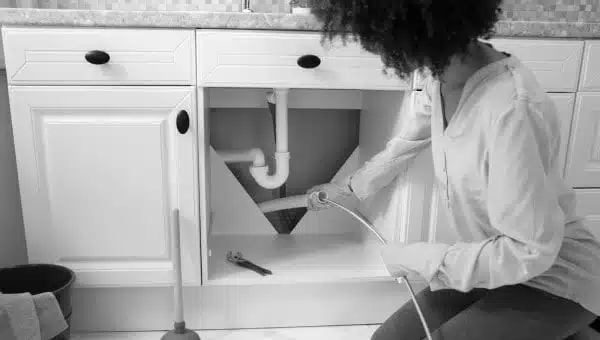It’s no secret that clogged drains can bring about an array of problems, including water damage and costly repairs. That’s why preventing clogged drains should be a priority for every homeowner. In this comprehensive guide, we’re going to walk you through the steps you can take to avoid this common plumbing headache.
Table of Contents
Understanding The Causes of Clogged Drains
The first step to effectively combat clogged drains is getting familiar with what triggers these blockages. The typical offenders vary depending on the location in your home. For instance, your kitchen sink is often victim to remnants of grease, particles of food, and built-up soap scum.
On the other hand, your bathroom drains are more prone to blockages from an accumulation of hair, soap residue, and various toiletries. In your toilet, excessive use of toilet paper or flushing of non-degradable items can set the stage for a clog. Gaining a clear understanding of these common causes empowers you to be more proactive and strategic in your prevention efforts.
Implement Regular Drain Inspections
Adopting a routine of frequent drain inspections is an effective approach in warding off clogged drains. Regularly scheduled examinations of your drain system empower you to identify budding problems before they escalate. One useful tool for these inspections is a compact handheld drain camera.
Such devices offer you a precise visual of your drain’s interior, assisting in the early detection of any obstruction. By keeping an eye on your drains and nipping problems in the bud, you’ll be well on your way to maintaining a healthy, clog-free drainage system.
Utilize Sink Strainers and Drain Covers
Sink strainers and drain covers offer an uncomplicated yet potent defense against drain blockages. These devices work by acting as a barrier, capturing debris that might otherwise end up causing obstructions in your plumbing system. Whether it’s food particles in your kitchen sink or hair in your bathroom drain, sink strainers and drain covers can significantly reduce the amount of unwanted material that makes its way into your drains.
However, the effectiveness of these devices doesn’t end at installation. To maximize their benefit, it’s crucial to clean these components on a regular basis. A build-up of captured debris can render them less efficient over time. So, as part of your routine, take a few moments to clear them out, ensuring they remain a formidable first line of defense against clogs in your plumbing system.
Keep Grease Out of Your Drains
A major culprit behind kitchen sink clogs is grease. It may seem harmless when in a liquid state, but as it cools down, it solidifies and adheres to the inner lining of your pipes, eventually leading to blockages. While it might be convenient to dump cooking fats and oils down your sink, this habit can come back to haunt you in the form of a stubborn clog.
The best practice is to never allow grease to enter your drain in the first place. Instead of disposing of it down your sink, collect your cooking grease in a separate container. Once it has cooled and solidified, it can then be safely thrown away in your household trash. This simple yet effective habit can go a long way in maintaining the integrity of your kitchen plumbing system.
It’s all about forming good habits and making minor changes in your daily kitchen routine. With consistency, you can avoid the inconvenience and cost of dealing with a clogged drain.
Be Mindful of What You Flush
One of the key strategies in preventing clogged drains in your bathroom involves exercising caution with what you send down your toilet. It’s easy to get misled by product labels that claim certain items as “flushable”.
Unfortunately, the reality is that most of these, including wipes, do not disintegrate in water as they should, and over time, they can lead to severe blockages. Similarly, items like feminine hygiene products, cotton swabs, and even large amounts of toilet paper can be detrimental to your plumbing system.
It’s advisable to follow the “three Ps” guideline – only urine, feces, and toilet paper should find their way into your toilet. This rule serves as a simple and straightforward reminder of what your toilet is designed to handle. By sticking to this guideline, you’re doing your part to keep your bathroom’s drainage system operating as it should.
While it may require a bit of a change in habits, especially if you’re used to disposing of other items in your toilet, the effort is well worth the payoff. Remember, each item you avoid flushing can be the difference between a free-flowing drain and a frustrating blockage.
It’s not just about maintaining the efficiency of your drainage system, but also about preventing the potential damage and expense that comes with severe clogs. Remember, a small adjustment in your routine can lead to significant savings in your time, money, and stress levels in the long run. So, think before you flush, and make this simple rule a part of your bathroom etiquette.
Use Natural Drain Cleaners
In your quest to keep your drains clean and free-flowing, don’t overlook the potential of natural remedies. These can be a safe and eco-friendly alternative to abrasive chemical cleaners that pose a risk to your pipes. A tried and true method is the use of baking soda and vinegar – ingredients you likely already have in your kitchen.
Here’s a simple guide to using this dynamic duo for your drains: start by emptying half a cup of baking soda into the drain, followed promptly by a similar amount of vinegar. Allow this mixture to sit for about 15 to 20 minutes, during which it will work its magic, breaking down minor obstructions.
Finally, wash it all down with hot water to clear the mixture and any dislodged debris from the drain. Regularly employing this natural method can assist in managing minor blockages and maintaining the efficiency of your drains.
Remember, preventive maintenance is often the best approach when it comes to plumbing. So, make this baking soda and vinegar routine a part of your home maintenance strategy. This small but significant step can make a world of difference in your endeavor to prevent clogged drains.
Consider Professional Drain Cleaning
While the above-mentioned steps can significantly aid in preventing clogged drains, there may be instances where blockages persist despite your best DIY efforts. This is where the services of a professional come into play.
Plumbing professionals possess specialized knowledge and tools designed to handle more complex drain problems. Their expertise allows them to not only dislodge stubborn clogs but also to inspect the overall health of your plumbing system. They can identify and rectify potential issues that might not be obvious to the untrained eye, preventing future complications.
Getting your drains professionally cleaned could be seen as an investment towards the longevity of your plumbing system. It helps to consider professional drain cleaning not as an added expense, but as a preventive measure against potential water damage which could prove far costlier in the long run.
So, when DIY methods fall short or you’re dealing with a recurring clog, don’t hesitate to seek the assistance of a licensed plumber. After all, your home’s plumbing system is a crucial component of its overall functionality and deserves the care and attention that a professional can provide.
Preventing Clogged Drains
Distinguished by our unwavering commitment to punctuality, our team stands out for promptly addressing your plumbing needs without undue delays. Our professionalism shines through from the moment we set foot in your home until we complete the job at hand. We don’t just respect your time, we also appreciate your space. Once we’ve finished our work to your satisfaction, we make sure to leave your home in the same clean and tidy condition it was in when we arrived.

